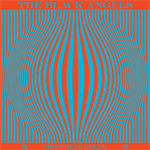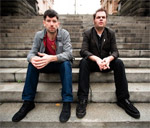| |
|
|
|
|
|
|
| |

$16.99 CD


|
|
NINO ROTA
Music for Fellini Part One: 1952 to 1958
(El / Cherry Red)
 "Le Notti Di Cabiria" "Le Notti Di Cabiria"
 "Coimbra" "Coimbra"
Cinema is the marriage of sound and image, and more often than not, it's a pretty rocky union. One medium tends to overshadow the other, and much of the music scored for films sounds pretty derivative; at its worst, the incidental music for a movie is either forgettable, a knock-off of a pop song, or just plain distracting. But then there are collaborations between director and composer that seem joined together like a cinematic suicide pact: Ennio Morricone's twangy, galloping score for Sergio Leone's The Good, the Bad, and the Ugly; Ry Cooder's haunted slide guitar in Wim Wenders' Paris, Texas; or the romantic deep-space rumblings provided by Jerry Goldsmith for Ridley Scott's Alien. But of all the director-composer relationships in movie history, none is quite as serendipitous or perfect as the seventeen-film streak carried by Nino Rota for Italian auteur Federico Fellini.
This collection from El brings together all the music composed by Rota for Fellini's first six films, and it's easily my favorite release this year. Though Fellini's first solo feature, The White Sheik, was a box-office failure, Rota's theme succinctly captures the bombast and absurdity of the film's goofball plot. For I Vitteloni, Rota's suite is wistful and more romantic, but underneath the dreamy arpeggios is a melancholic undercurrent that also plagues the lead of the film, Fausto Moretti (played by Franco Fabrizi); the middle of this suite is punctured by seemingly aimless barkings of a trumpet and the amateurish banging of dissonant piano chords, and the ugliness of the score underlines the ugliness of the film's generally despicable characters.
Yet the most impressive of the whole collection is Rota's music for La Strada, a haunting, tragic odyssey that features a host of musical cues that range from sensual mambos to loping, mournful orchestral works. These quieter pieces are nicely juxtaposed against the crashing brass that signifies the film's more dramatic and fatal moments, or the moments of brief, circus-like whimsy that punctuate Fellini's dark, touching masterpiece. Rota's score for Fortunella brings Part One to a close, and fans of Francis Ford Coppola will recognize the theme immediately: it becomes clear that for those gorgeous, lilting love themes from The Godfather, Rota recycled a good portion of his work on Fortunella. The two scores feel very different, though -- Fortunella is characterized by more strings and a larger orchestral feel, while the same arrangements in The Godfather sound like the work of a mournful gypsy chorus, with an emphasis on the mandolin and woodwinds instead of strings.
Listening to the scores without the aid of Fellini's iconic images is liberating, and the spirit and whimsy of Italy can be felt in every cue. The fruits born from the most famous partnership in film history are delectable in every way, and Part One deserves the highest recommendation possible for those who love film and who love music. [MS]
Order CD by Texting "omcdninomusic" to 767825 |
|
| |
|
|
|
|
|
|
|




































